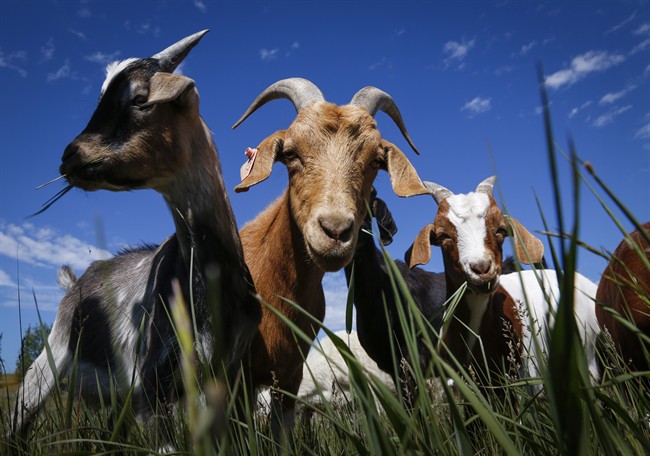What has four legs, is seemingly on the City of Edmonton payroll, and apparently works for food? A herd of goats that’ll be part of a pilot project this summer handling weed control.

The contract with Jeannette Hall, owner and shepherd of Baah’d Plant Management, should be completed next week.
By July you’ll see about 200 goats, as well as support staff, taking care of a portion of Rundle Park as part of a pilot project.
“Seeing is believing,” Hall said alongside of Shaganappi Trail on the University of Calgary campus where a pilot project proved successful last year. “Now that we’ve done it in Calgary and we’ve got millions of people here who are just loving it, I think it’s only going to become more common place in Alberta.”
Hall said the science behind it is 20 years old and proven.
“These guys are actually wonderful athletes so they can cover up to 30 kimometres a day, they’re very sure footed so they can tackle all kinds of areas that would be safer than for humans to go work at.
“We can also get right up close to bodies of water as well that you couldn’t come in and spray or mow those areas very easily.”
The trick is, the goats actually see the weeds as something special.
“They’re actually browsers. So they naturally prefer broad leaf plants, and seeds and bark over grass, so that’s wonderful,” Hall said. “We just kind of utilize that. And what we do is target browse. We aren’t just sending them in grazing an area. We are using our dogs and our horses and ourselves to herd the goats and keep them on specific weeds.”
“If there’s ever a weed species that I find they aren’t eating I have a number of different ways that I go ahead and train and teach them to eat it. They all learned to eat from their mothers and because they associate me with treats, anything that I’m asking them to eat or am holding they right away associate is good.”
Unlike lawn mowers that cut and toss the weed clippings to the side, the goat’s digestive systems stop the cycle.
“These guys destroy the seed in their droppings so they’re not redistributing it”
The city is interested in the pilot project because it “continually looks for ways to improve how it manages weeds, balancing costs with environmentally sustainable practices,” Kristen Wagner said in an email.
By using goats instead of herbicides the goal is to manage three specific types of weeds — Canada Thistle, Leafy Spurge and Common Tansy.
“Rundle Park was selected for the pilot because it has a mix of terrain, including slopes, forested, mowed and natural grass areas,” Wagner wrote. “Mixed terrain allows us to trial the effectiveness of goats in different parkland environments. Each of the targeted noxious weeds are present in Rundle Park, as well as other areas of the city.
Once the pilot wraps up in September, city staff will provide city council with a cost benefit analysis.






Comments